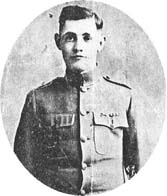Chapter 2
THE WORLD WARS: SACRIFICES AROUND THE GLOBE
|
|
World War I: "The Great War" (1914-1918)
|
"It is a war against all nations. American ships have been sunk, American lives taken, in ways which it has stirred us very deeply to learn of, but the ships and people of other neutral and friendly nations have been sunk and overwhelmed in the waters in the same way. There has been no discrimination. The challenge is to all mankind. Each nation must decide for itself how it will meet it. The choice we make for ourselves must be made with a moderation of counsel and a temperateness of judgment befitting our character and our motives as a nation. We must put excited feelings away. Our motive will not be revenge or the victorious assertion of the physical might of the nation, but only the vindication of right, of human right, of which we are only a single champion."
President Woodrow Wilson (1856-1924)
28th President of the United States
War Message to Congress
April 2, 1917 |
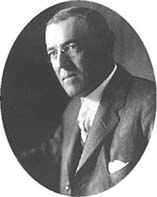
|
|
June 28, 1914 – The assassination of Archduke Ferdinand at Sarajevo sets in motion the diplomatic maneuvers that result in war.
August 1, 1914 – Germany declares war on Russia and on August 3, 1914, declares war on France.
War becomes widespread. When Germany violates Belgian neutrality, Great Britain enters the war with the Allied Nations of France, Russia, Serbia, Belgium, and Japan against the Central Powers of Germany and Austria-Hungary.
The war continues. Portugal and Romania join the Allies in 1916; Greece declares war on the Central Powers in 1917.
April 6, 1917 – The United States breaks off its relations with Germany and enters the war.
|
|
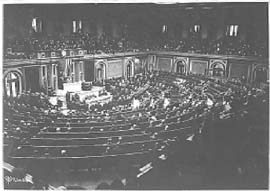
President Wilson delivers War Address to Congress, April 2, 1917 – NARA photo
|
In June 1917, the first troops of the American Expeditionary Forces (AEF), commanded by General Pershing, land in France.
|
I vote in honor of Allan Picard, who served with General John Pershing against the Mexican bandit Pancho Villa and later was one of the first men from Millinocket to enlist in World War I.
John C. Picard, Millinocket
Served in Vietnam
|
The responses about World War I veterans who served in France reveal the affection and honor with which they are remembered: |
I'll be proud to cast my vote in honor of my friend, Everett McKenney, who served in the Army in France during World War I. In July 1999, he received the Legion of Honor, France's highest award given to foreigners, from the French consul. He died at the age of 104 on September 3, 1999. Although his military service had ended over 80 years earlier, it was still one of the most important, most defining, aspects of his life.
Robin Wilkinson, Augusta
|
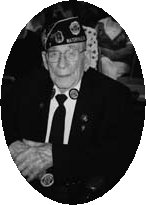
Everett McKenney
|
|
I am voting in honor of my father, Grover L. Johnson, who served in the U.S. Army in France in 1918 and received a testimonial attesting to his patriotism, valor and devotion to duty from the State of Maine.
George Robert Johnson, Brunswick
Served in WWII, Korea & Vietnam
|
My uncle, Sgt. Guy Malcolm Yeaton, served with the 5th Marines, 2nd Division and was killed in action at Blanc Mont Ridge, France, on October 4, 1918, the bloodiest day of the war. 1,000 men had to take Blanc Mont Ridge where the Germans had been entrenched for 4 years. When the battle was over, the Germans were dead or running. There were 134 Marines left standing.
Sgt. Yeaton fought in every major battle in France. He received the highest awards for valor that the French military had to offer, including the Cour de Geir. In letters home – all addressed from "somewhere in France" – the family learned he was recommended for the Distinguished Service Cross. To my knowledge, he never received it because he was killed shortly thereafter.
If people like my uncle hadn't fought in WWI, would we be where we are today?
David P. Speed, Isleboro
USCG (Ret.)
|
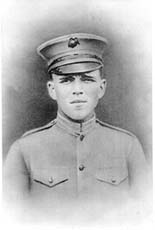
Guy Malcolm Yeaton
|
Marion MacEwan, my great-aunt, was a Scottish immigrant who enlisted in the U.S. Army Nurse Corps during WWI. She served 10 miles behind the front lines in France. Nurses were ordered to leave the wounded if the Germans invaded, but all nurses refused to obey the order. She is buried at Arlington Cemetery.
Nancy L. Kuzil-Roberts, Windsor
Served in Korea
|
|
I will vote in honor of my great-uncle, George McKelvey, who was in the Army stationed in France in World War I. He was thrown in a pile for dead. When he came home, he carried with him his death papers.
McKelvey's great-niece provided the following unidentified newspaper account:
"McElvey's outfit, Company L of the 320th Infantry, was making an advance in the Argonne Forest on October 11, 1918, exactly one month before the Armistice. The Germans were beginning to crack up, but they were still putting up a tough defensive battle as they retreated. Everything was going well for George until a German machine-gun sniper ripped him with sixteen slugs while he was trying to dodge across an open clearing. |
|
From then on, he was unable to walk and totally unable to use his left arm. A corporal with his right wrist shot off carried, rolled, and dragged him to a First Aid Station behind the lines. There was rain, they ploughed through mud, and just before they got there, the Boche laid down a gas barrage. The two of them, with only two usable hands between them, managed to get gas masks adjusted on each other.
McKelvey was then carried to a sector hospital to have some more patching done. The hospital was filled to the gills, and they had to lay him on the soggy ground outside with the other wounded soldiers. Five minutes after his turn came and he was moved into the hospital, a German shrapnel shell burst over the others still remaining in the courtyard.
On February 2, 1920, after staying in hospitals in France and at Camp Meade, McKelvey arrived at his home in Johnetta, Pennsylvania. His family still thought he was dead and had a certificate from the War Department to prove it. They had even conducted funeral services at the family cemetery plot. But it was a gala day for Johnetta after they got over the shock of seeing a dead man walking.
The Overseas Medal and the Order of the Purple Heart were awarded to George. He received them from Washington through the mail after the war."
Elizabeth Pulk, Dixfield |
|
PROJECT HONORS FORGOTTEN SACRIFICES
"On November 30, 1917, a 24-year-old soldier names Harold T. Andrews became the first man from Maine to die in World War I. He was killed while fighting off German soldiers with a shovel on the battlefield in Frnace, far from his Portland home.
His valiant sacrifice was honored in 1921 with a memorial planting of linden trees along Baxter Boulevard that still exists today, even though the public largely is unaware of their symbolism."
–from the Archives of the Portland Press Herald
December 3, 2000
|
|
Some Maine voters specifically recalled their fathers' experiences in this war:
|
My father, Paul F. "Ginger" Fraser, served in France and Germany in the First World War as an officer in the infantry. He had to lift his gas mask to issue orders and the mustard gas left him with a damaged heart. He died at age 45 as a result of his heart damage. I will be proud to cast my vote on Election Day in his honor and in honor of all of our veterans.
Janet F. Mitchell, Waterville
|
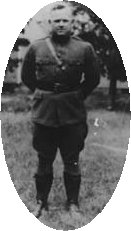
Paul F. Fraser
|
My father, Ralph O. Stevens, served in WWI. He was gassed in Germany. He died from it 15 years later. I was only 3 years old.
Carolyn Ferguson, Biddeford
|
Benjamin B. Twitchell, Sr., my father, served in WWI in the 151st Depot Brigade. A horse or mule kicked him while he was hooking up a piece of artillery equipment. Because of this accident, he lost his left eye and had to have a steel plate in his forehead.
Erland P. Twitchell, Bryant Pond
Served in US Air Force in Korea
|
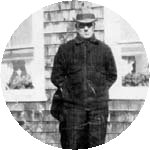
Benjamin B. Twitchell, Sr.
|
I will cast my vote in tribute to my father, Carl R. Young, a WWI veteran. His unit trained at Bates College in Lewiston before going to Europe. After that war, he met many WWII casualties and assisted families with a proper military burial if the family requested his help. He also played a part in the American Legion's work on the GI bill, which produced very important results for veterans. He voted in every election. My mother did also. Voting was especially important to her because she could not legally vote until she was 26 – she was born in 1894.*
William A. Young, Auburn
Served in Korea from 1951-55
*The 19th Amendment to the Constitution, ratified on August 18, 1920, guarantees all American women the right to vote.
|
I vote in honor of my father, Peter P. Mich, who served in the Army in WWI.
Peter J. Mich, Englewood, FL
Served in the Pacific, 1944-46
|
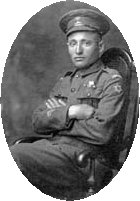
Morris Shapiro
|
I am paying tribute to my father, Morris Shapiro, who joined the Jewish Legion of the British Army in WWI. He served in Palestine and fought against the Turkish Army. He served in the same regiment with Ben-Gurion, future Israeli Prime Minister.
Samuel Shapiro, Waterville
Served in WWII, former Treasurer, State of Maine
|
|
Several responses, like the following, included information from veterans' diaries. Frank J. Mulcahey, kept a diary during his service in France. His son, Daniel Mulcahey, shared the following details of his father's travels:
|
Travel of 79th Division, WWI (1918). Left Camp Meade, Maryland, July 6th. Entrained at Disney, Maryland for port of embarkation, which was Hoboken, New Jersey. Boarded ship USS Leviathan July 7th. Sailed 6:20 p.m., July 8th, arrived at Brest, France 11:00 a.m. July 15th. Hiked to a rest camp 5 miles. Arrived there at 11:00 p.m. Parade at Brest. Left rest camp 2:00 a.m. July 19th. Hiked back to city of Brest for a 3-day ride in box cars (side door Pullmans) to the town Largnes. Left Largnes 8:00 am July 22nd. Hiked 9 miles to Coulmer-Le-Sector. Left Coulmer-Le-Sector July 24th in motor trucks for a 40-mile ride to Pierrecourt (lost on road)… Remained on front line until November 20th.
Daniel Mulcahey, Brooks
Served in Vietnam
|
Interesting stories about the citizenship of military personnel were the focus for some of the World War I responses: |
I am voting in honor of my father, William A. Naimey, who served in the Army in World War I and gained his citizenship through the service.
Norman W. Naimey, Cape Elizabeth
Served in Korea
|
My grandfather, Wesley Thompson, was an American citizen who fought in the Army for Canada before the U.S. entered WWI. He earned the Victoria Cross but died in action 3 days before the war ended.
Wesley B. Thompson, Auburn
|
My father, Walter Szlyk, came to the United States from Poland. He enlisted in the U.S. Army Air Corps during WWI and served at Kelly Field in Texas.
Paul R. Szlyk, D.M.D., York Beach
Served in Dental Corps in Greenland &
Ft. Devens
|
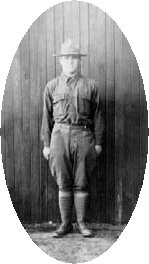
Walter Szlyk
|
|
In several requests for buttons, writers identified the job that a veteran had during his military service: |
I am voting in honor of my grandfather, Robert A. Craig, Sr., who served in Compay C, 301st Ammunition Train, Camp Devens, Massachusetts. He left Mars Hill on April 27, 1918, and after training at Camp Devens, he went by train to Montreal, then down the St. Lawrence to Quebec and on to Halifax. His convoy sailed from there to Liverpool, England, and then on to Cherbourg, France. During his military service he drove a Harley with a sidecar that carried officers to the front lines.
This picture of him was taken in a French war studio in Noyers, France at a cost of twelve francs for one dozen pictures. Army pay at the time was $33.00 a month with $6.50 deducted for insurance, leaving him with a net wage of $26.50! After his service, he went on to earn his living repairing jewelry and clocks in southern and central Aroostook.
Stuart Craig, Mars Hill
Served in US Navy, 1976-79
|
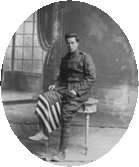
Robert A. Craig, Sr.
|
My father, Frank Lumbert, was stationed in Massachusetts during WWI and on his discharge papers it states that he was saddler.
Lillian Mabel Adams, Canton
|
Equally interesting were responses that made special mention of a veteran's age: |
My grandfather, Maurice LeBlanc, served in WWI and was used as an interpreter. He joined at age 42 – he lied about his age and ended up going to France with his son.
Maurice A. White, Castle Hill
Served in Vietnam
|
My great-uncle, Donald F. Crain, is a WWI vet. He's still alive at 102!!
Daniel Hawes, Steep Falls
|
| |
The War Ends
At 11:00 a.m. on November 11, 1918, World War I ended – and the Armistice was signed. Germany had to evacuate its troops immediately from all territory west of the Rhine. The war ended without a single truly decisive battle having been fought.
To calculate the total losses caused by the war is impossible. A conservative estimate is about 10 million dead and 20 million wounded. Because this immense suffering gave rise to a general revulsion to any kind of war, many people placed their hopes for peace in the newly created League of Nations.
Regrettably, World War I, the "war to end all wars," represented a transition to a new kind of warfare, one that harnessed the power of air forces, chemical weapons, mechanized artillery and tanks – all of which laid the groundwork for the Second World War. |
In 1919, President Woodrow Wilson proclaimed November 11th as Armistice Day to remind Americans of the tragedies of war. A law adopted in 1938 made the day a federal holiday.
In 1954, Congress changed the name of the holiday to Veterans Day to honor all veterans.
|
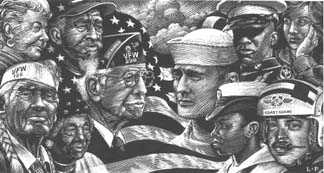 —U.S. Navy image
—U.S. Navy image
|
|
| |
The following poem by John J. McCrae remains one of the most memorable war poems ever written. It recalls a terrible battle in the spring of 1915. Major McCrae was a surgeon attached to the 1st Field Artillery Brigade who had spent 17 days treating injured men – Canadians, British, Indians, French, and Germans. The death of a young friend and former student on May 2, 1915 so affected him that he composed this now-famous poem.
IN FLANDERS FIELDS
In Flanders fields the poppies blow
Between the crosses, row on row,
That mark our place; and in the sky
The larks, still bravely singing, fly
Scarce heard amid the guns below.
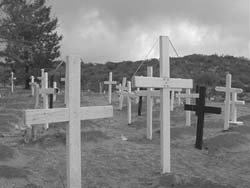
We are the Dead. Short days ago
We lived, felt dawn, saw sunset glow,
Loved, and were loved, and now we lie.
In Flanders fields.
Take up our quarrel with the foe:
To you from failing hands we throw
The torch; be yours to hold it high.
If ye break faith with us who die
We shall not sleep, though poppies grow
In Flanders fields. |
Additional Tributes Submitted Online
I will be voting in honor of my father, Frank Chester Black (1895-1961). Dad fought for the Army, as a private, in France, from 1916-1918. He served with the Co. A116 Ammo Train. He was from St. George, Maine. Although I never had the opportunity to know my Dad (he died just before my birth) my love for him transcends this small barrier. It is with great pride that I carry his memory with me on voting day and all other days as well.
Lillian Myrtle Black
|
|
Tribute to my father, Joseph Michaud:
I would like for my fathers name to be entered into your list of men who served our country. My father Joseph Michaud served in WW I at the age of 18. He fought in France and received an honorable discharge in 1919.
Marie Pelletier, Fort Kent
Tribute to my Great Great Uncle, Roland McLaughlin:
Fought in the Argonne Forest and died at Fort McHenry February 14, 1919 from wounds received. He was brought home to be buried.
Caroline LaPato, Taunton, MA
Tribute to my Great Uncle, Cyril Levesque:
Served in France in either 1917 or 1918 he wouldn?t talk about it, and said it wasn?t much fun.
Joe Campbell, Mauldin, South Carolina
Tribute to my Father, Abraham Weisman:
My father fled the persecution of Czarist Russia, found freedom in the U.S. and served proudly with The AEF in France 1918-1919.
Maurice Weisman, Portland, Maine
Tribute to my Grandfather, Meltiah Scammon:
Chief Machinist Mate Scammon served in the US Navy from 1917 to 1918, stationed aboard the patrol vessel USS Wissahickon, at the Rockland, ME Naval Section Base.
William Freeman, Rancho Cucamonga, CA
Tribute to my Grandmother, Anna Marie Sundburg Tobey:
During WWI, my Grandmother served bravely on the front in France, as a Nurse in a MASH unit. In the operating room she met her future husband, Dr. Harold Grant Tobey, my Grandfather. Later, their son, Harold Grant Tobey, Jr. served and died as a result of WWII.
Thank you all.
Andrea Williams, Wells, Maine
Tribute to my great grandfather, Leroy Francis Cotton:
My great grandfather Leroy Cotton died at Chateau Tierney, France during WWI in 1918, he left behind a baby girl who was my grandmother.
April Powell, Sanford, Maine
Tribute to my Father, James Widdecombe:
My father enlisted in the Army in 1917 and was trained in chemical warfare. According to his medals he fought 5 battles in France as part of the original "Hellfire Boys". The First Gas Regiment. He was injured by German Mustard gas in March of 1918 and in 2003 he was awarded his purple heart. As the war came to and end and he returned home to Rockland, jobs were scarce. My father went back and enlisted and served 2 more years in the Navy. My father Went to meet God after many years of suffering with just one lung. The Mustard Gas got the other one.
James C. Widdecombe, South Portland, ME
Tribute to my Father, Henry J. Belrose:
Spent his whole life as a totally disabled Veteran. He could not have a job. Was never able to hold a drivers license and lived with grand mall the rest of his life. He was a sniper, was captured, escaped and was hit by an artillery shell. Died from his wounds. A remarkable person.
Henry R. Belrose, Sapleigh, ME
Tribute to my Great Uncle, Lawrence Buteau:
My great uncle Lawrence Buteau lied about his age and enlisted June 1, 1917 as a private in Company M, 16th Infantry. He had just turned 16. He was killed in action less than a year later in the Somme. When he enlisted he gave a false home address so, although his family saw his name on a casuality list, they did not get official notification for weeks. His body was repatriated 2 years after his death and he is buried in the family plot in Skowhegan.
Enlisted: Portland, June 1, 1917. Private. Org: Co M 16 Inf. Overseas: Killed in action: May 6, 1918.
Sarah Dowling, Freeport, ME
|
